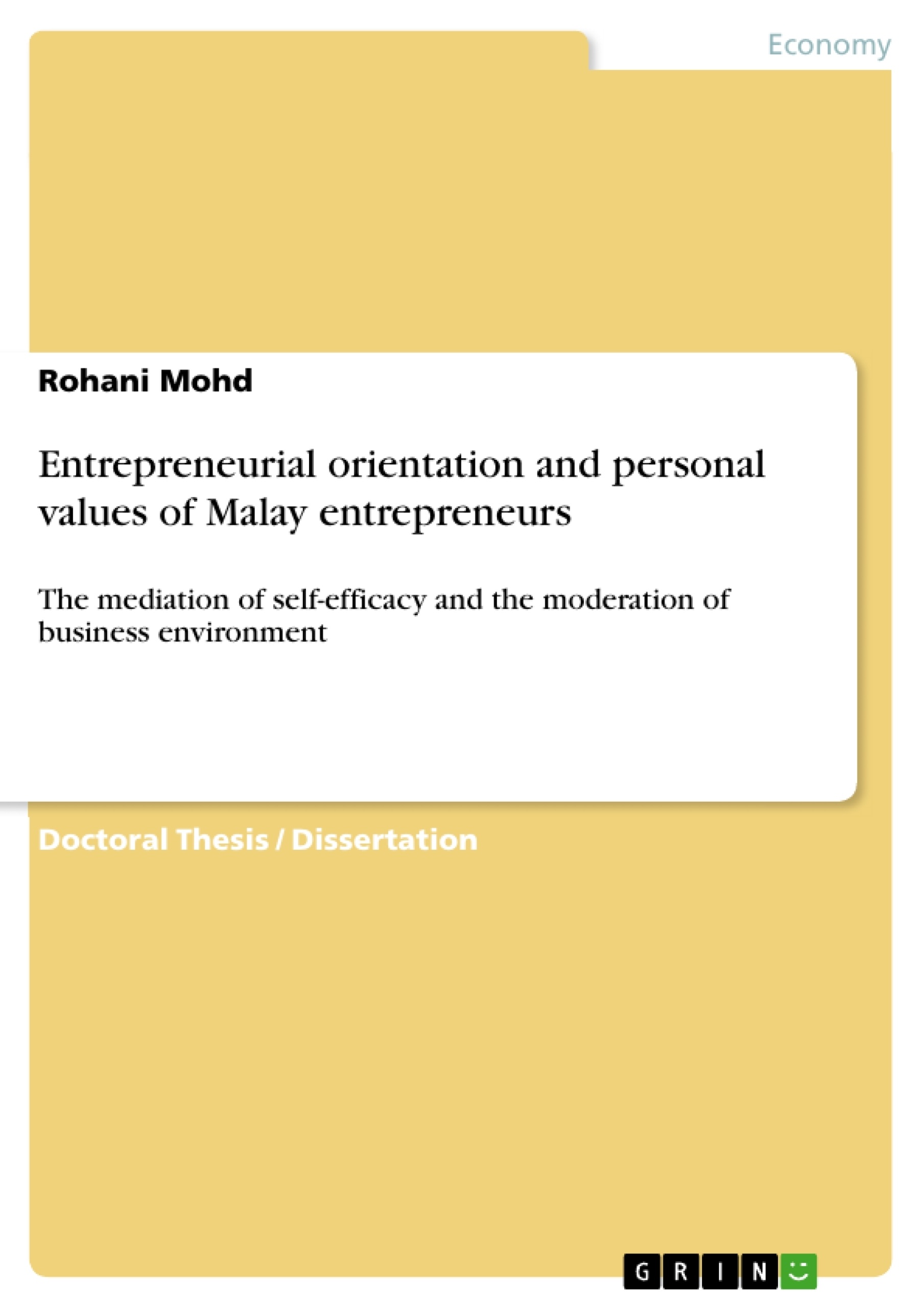This study examines personal values for its influence on entrepreneurial orientation, and determines the role of mediator [self efficacy (SE)] and moderator [business environment (BE)] variables on the relationship between personal values (PV) and entrepreneurial orientations (EO). The examination of the mediator-moderator effect involving PV, SE, BE, and their subsequent influence on EO was also undertaken. A survey was administered with the assistance of MARA officers the whole of West Malaysia. The data generated was based on 162 owner managers’ selfrating of PV, SE, BE and EO.
Rasch Model and SPSS programs were employed to analyze the data using several different analyses. Multiple regression, hierarchical stepwise regression, One Way ANOVA and Independent t-tests were used to test the hypotheses. The results provided general support for five out of the six hypotheses. Specifically, the direct relationship between personal values (especially religious values) and entrepreneurial orientations was found to be positively related. Different dimension of personal values predicted different dimension of entrepreneurial orientations. Self-efficacy was found to have positive relationship with entrepreneurial orientations; mediate the relationship between personal values of hard work and discipline, and also entrepreneurial orientations. However, business environment did not moderate the relationship between self-efficacy and entrepreneurial orientations. Therefore, the Rasch Model has developed a new entrepreneur competence measure as it generates four classifications of Malay owner managers. As this is a fresh finding, it serves as a new contribution for the present study.
The results suggested that religious values and self-efficacy motivation were needed to influence entrepreneurial orientation. Hence, the Malaysian government needs to improve the performance of Malay owner managers by providing them with training, focusing on reinforcing their religious values. This is particularly important for Malay owner managers who have just started in business and those who have survived in their business. The new construct developed for religious values, and the entrepreneurial competence measure employed were important contributions that should be replicated in other countries or other religions, to confirm on the applicability of the measure. [...]
Table of Contents
- Chapter One: Introduction
- 1.0 Introduction
- 1.1 Background of the Study
Objectives and Key Themes
This study aims to investigate the influence of personal values on the entrepreneurial orientation and performance of Malay small and medium-sized enterprises (SMEs) in Malaysia. It explores the impact of cultural and historical factors on the values held by Malay owner-managers and how these values relate to business success and failure.
- The role of personal values in entrepreneurial orientation.
- The impact of cultural and religious values on Malay entrepreneurs.
- The influence of historical factors (e.g., colonial policies) on entrepreneurial behavior.
- Comparison of Malay entrepreneurial practices with those of other ethnic groups in Malaysia.
- The effects of government support programs on Malay SME performance.
Chapter Summaries
Chapter One: Introduction: This chapter provides a comprehensive overview of the study. It lays out the background, highlighting the significant influence of entrepreneurial orientation (EO) on performance and the growing interest in understanding its determinants, particularly personal values. The chapter emphasizes the limited research on Malay SMEs in Malaysia despite their importance to the economy. It notes the disparity in business success between Malays and other ethnic groups, pointing to potential influences of culture, religion, and historical factors like the "divide and rule" policy. The chapter sets the stage for examining how these factors have shaped the values of Malay owner-managers and their impact on business outcomes, focusing on the gap in research concerning the what and how of improving Malay SME performance and growth.
Keywords
Entrepreneurial orientation, personal values, Malay SMEs, Malaysia, cultural influence, religious values, historical context, government support, SME performance, business success, ethnic differences.
Frequently Asked Questions: A Comprehensive Language Preview
What is the purpose of this study?
This study investigates how personal values influence the entrepreneurial orientation and performance of Malay small and medium-sized enterprises (SMEs) in Malaysia. It explores the impact of cultural, religious, and historical factors on these values and their relationship to business success.
What are the key themes explored in this study?
The study examines the role of personal values in entrepreneurial orientation; the impact of cultural and religious values on Malay entrepreneurs; the influence of historical factors (like colonial policies) on entrepreneurial behavior; a comparison of Malay entrepreneurial practices with other ethnic groups in Malaysia; and the effects of government support programs on Malay SME performance.
What is covered in Chapter One?
Chapter One provides a comprehensive introduction to the study. It discusses the background, highlighting the importance of entrepreneurial orientation (EO) and the need for further research on its determinants, especially personal values. It emphasizes the limited research on Malay SMEs in Malaysia and the disparity in business success between Malays and other ethnic groups. The chapter sets the stage for the rest of the study by focusing on the gap in research concerning improving Malay SME performance and growth.
What are the key words associated with this study?
Key words include: Entrepreneurial orientation, personal values, Malay SMEs, Malaysia, cultural influence, religious values, historical context, government support, SME performance, business success, ethnic differences.
What does the Table of Contents include?
The table of contents currently only shows Chapter One: Introduction, which includes sections on the general introduction and the background of the study. Further chapters are implied but not detailed in this preview.
What is the overall scope of this preview?
This preview offers a comprehensive overview of the study, including the title, table of contents (partially shown), objectives and key themes, a chapter summary (for Chapter One), and key words. It provides sufficient information for a reader to understand the study's focus and methodology.
- Citation du texte
- Rohani Mohd (Auteur), 2013, Entrepreneurial orientation and personal values of Malay entrepreneurs, Munich, GRIN Verlag, https://www.grin.com/document/293270



